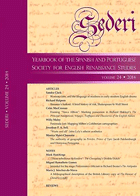
Sederi 24
Sederi 24 — 2014
EDITORS
Berta Cano Echevarría & Ana Sáez-Hidalgo
REVIEW EDITOR
Francisco J. Borge López
ISSN 1135-7789
Jonathan P. A. Sell, ’Warts and all’: John Lyly’s atheist aesthetics.” SEDERI 24 (2014): 95-118.
DOI: https://doi.org/10.34136/sederi.2014.5 Download PDF
Abstract
This paper finds some evidence of an atomist aesthetic in certain passages of John Lyly’s Euphues. The Anatomy of Wit. It then addresses the issue of how Lyly might have become acquainted with atomist philosophy and, in particular, the thought of Empedocles, whether through his reading or his membership of the Oxford circle. Finally, by showing how Lyly’s early play Campaspe combines his aesthetic views and atomist controversy, the paper confirms the reasonableness of its initial proposition and opens the way not only for a reassessment of Lyly and his works but also for a reappraisal of the baroque in early modern English literature and for a revision of standard accounts of the origins of English atomism.
Keywords: John Lyly; atomism; aesthetics; Empedocles; Euphues. The Anatomy of Wit; Campaspe.
References
Barish, Jonas 1956. “The Prose Style of John Lyly.” English Literary History 23: 14-35.
Berry, Philippa 1989. Of Chastity and Power: Elizabethan Literature and the Unmarried Queen. London: Routledge.
Bercovitch, Sacvan 1968. “Empedocles in the English Renaissance.” Studies in Philology 65/1: 67-80.
Bevington, David 1996. Introduction. Endymion. By John Lyly. Ed. David Bevington. The Revels Plays. Manchester: Manchester University Press: 1-71.
Blair, Hugh, ed. 1753. The Works of Shakespear. In which The BEAUTIES observed by POPE, WARBURTON, AND DODD are pointed out. 8 vols. Edinburgh: Sands, Murray and Cochran.
Blum, Paul Richard 2012. Giordano Bruno: An Introduction. Amsterdam–New York, NY: Rodopi.
Blunt, Anthony 1940. Artistic Theory in Italy, 1450-1660. Oxford: Oxford University Press.
Bruno, Giordano 2007. Opere Italiane. Ed. and comm. Giovanni Aquilecchia, Nicola Badaloni, Giogrio Bàrberi Squarotti, Maria Pia Ellero, Miguel Angel Granada and Jean Seidengaert. Turin: UTEL Libreria.
Campbell, David 1999. Rev. of David Sedley Lucretius and the Transformation of Greek Wisdom (Cambridge: Cambridge University Press, 1998). Bryn Mawr Classical Review 29 October 1999. <url: http://bmcr.brynmawr. edu/1999/1999-10-29.html>. Last accessed 16/01/2012.
Chaucer, Geoffrey 1957. The Complete Works of Geoffrey Chaucer. Ed. F. N. Robinson. Oxford: Oxford University Press.
Checa, Fernando and José Miguel Morán 1982. El Barroco. Madrid: Istmo.
Coryat, Thomas 1905 (1611). Coryat’s Crudities. 2 Vols. Vol. 1. Glasgow: James MacLehose and Sons.
Dante, Aligheri 1981. The Divine Comedy. Trans. Geoffrey L. Bickersteth. Oxford: Basil Blackwell.
Dekker, Thomas 1904 (1609). The Gull’s Hornbook. Ed. R. B. McKerrow. London: De la More Press.
Empedocles 1838. Empedoclis Agrigrentini Carminum reliquiæ. Ed. Simon Karsten. Amsterdam: Sumptibus Johannis Müller.
Fontanelle, Bernard le Bouvier de 1730. Dialogues of the Dead: In Three Parts. Trans. John Hughes. 2nd. edition. London: J. Tonson.
Gannon, C. C. 1976. “Lyly’s Endimion: From Myth to Allegory.” English Literary Renaissance 6/2: 220-243.
Garani, Myrto 2007. Empedocles Redivivus: Poetry and Analogy in Lucretius. New York and Abingdon: Routledge.
Grafton, Anthony 1983. Joseph Scaliger: A Study in the History of Classical Scholarship. 2 vols. Vol. 1. Oxford: Clarendon Press.
Gregory, Tullio 1998. “‘Libertinisme érudit’ in Seventeenth-Century France and Italy; The Critique of Ethics and Religion.” British Journal for the History of Philosophy 6: 323-349.
Greenblatt, Stephen 2010. Shakespeare’s Freedom. Chicago: University of Chicago Press.
Greenblatt, Stephen 2011. The Swerve: How the World Became Modern. New York and London: W. W. Norton.
Greenlaw, Edwin 1920. “Spenser and Lucretius.” Studies in Philology 17/4: 439-464.
Hadfield, Andrew 1998. Literature, Travel, and Colonial Writing in the English Renaissance. Oxford: Clarendon Press.
Hanak, Miroslav John 1970. “The Emergence of Baroque Mentality and Its Cultural Impact on Western Europe after 1550.” The Journal of Aesthetics and Art Criticism 28/3: 315-326.
Hirsch, Hedrich D. A. 1991. “Donne’s Atomies and Anatomies: Deconstructed Bodies and the Resurrection of Atomic Theory.” Studies in English Literature 31/1: 69-94.
Hill, Christopher 1997. The Intellectual Origins of the English Revolution Revisited. Oxford: Oxford University Press.
Hollander, Martha 1998. “Baroque Aesthetics.” The Encyclopedia of Aesthetics. Ed. Michael Kelly. 4 vols. New York and Oxford: Oxford University Press: 202-203.
Hunter, G. K. 1962. John Lyly: Humanist as Courtier. Cambridge, Mass.: Harvard University Press.
Hunter, G. K. 1991. Introduction to Campaspe. Campaspe. Sappho and Phao. By John Lyly. Eds. G. K. Hunter and David Bevington. The Revels Plays. Manchester: Manchester University Press: 1-43.
Hunter, G. K. 2004. “Lyly, John (1554-1606).” Oxford Dictionary of National Biography. Oxford: Oxford University Press. <url: http://www.oxforddnb.com/ view/article/17251>. Last accessed 04/02/2014.
Israel, Jonathan 2001. Radical Enlightenment: Philosophy and the Making of Modernity. Oxford: Oxford University Press.
Jardine, Lisa 1974. “The Place of Dialectic Teaching in Sixteenth-Century Cambridge.” Studies in the Renaissance 21: 31-62.
Jones, Howard 1989. The Epicurean Tradition. London and New York: Routledge.
Josselyn, John 1865 (1671). New England’s Rarities Discovered in Birds, Beasts, Fishes, Serpents, and Plants of that Territory. Boston: William Veazie.
Kargon, Robert 1964. “Walter Charleton, Robert Boyle and the Acceptance of Epicurean Atomism in England.” Isis 55/2: 184-192.
Kesson, Andy 2014. John Lyly and Early Modern Authorship. Manchester: Manchester University Press.
Kinney, Arthur F. 1986. Humanist Poetics: Thought, Rhetoric and Fiction in Sixteenth-Century England. Amherst: University of Massachusetts Press.
Laertius, Diogenes 1925. Lives of the Eminent Philosophers. Trans. Robert Drew Hicks. 2 vols. Harvard, Mass: Harvard University Press.
Leonard, William Ellory 1908. “Empedocles: The Man, the Philosopher, the Poet.” The Fragments of Empedocles. Trans. William Ellory Leonard. Chicago: Open Court: 1-12.
Lucretius Carus, Titus 1982. De Rerum Natura. Trans. W. H. D. Rouse. Rev. Martin Ferguson Smith. Cambridge, MA: Harvard University Press.
Lyly, John 1902. The Complete Works of John Lyly. Ed. Warwick R. Bond. 3 vols. Oxford. Clarendon Press.
Lyly, John 1916 (1578; 1580). Euphues: The Anatomy of Wit and Euphues His England. Eds. Morris William Croll and Harry Clemons. London: George Routledge.
Marzillo, Patrizia 2011. “‘Would you check my edition please?’ Scaliger’s annotations to some poetical / philosophical texts.” Eds. Bernard Huss, Patricia Marzillo and Thomas Ricklin. Para/textuelle Verhandlungen zwischen Dichtung und Philosophie in der Frühen Neuzeit.Berlin/New York: De Gruyter: 399-417.
McGowan, Richard J. 1985. “Thomas’s Doctrine of Women and Thirteenth-Century Thought.” Essays in Medieval Studies 2: 209-226.
Maguire, Laurie 2009: Helen of Troy: From Homer to Hollywood. Chichester/Malden, MA: Wiley-Blackwell.
Nelson, Alan H. 2003. Monstrous Adversary: The Life of Edward de Vere, 17th Earl of Oxford. Liverpool: Liverpool University Press.
Nowicki, Andrzej 1970. “Vanini e il paradosso di Empedocle.” La Zagaglia 46: 208-217.
Passannante, Gerard 2008. “The Art of Reading Earthquakes: On Harvey’s Wit, Ramus’s Method, and the Renaissance of Lucretius.” Renaissance Quarterly 61/3: 792-832.
Pearl Distributors 2012. Pearl Fashion History. Pearl Distributors. <url: http://www.pearldistributors.com/pearl-history-fashion.php>. Last accessed 17/02/2013.
Picallo, Marcia E. 2008. Análisis de la influencia de Antonio de Guevara en la obra de John Lyly. Proquest.
Pincombe, Michael 1996. The Plays of John Lyly: Eros and Eliza. Manchester: Manchester University Press.
Plutarch 1603. Plutarch’s ‘Moralia’. Twenty Essays. Trans. Philemon Holland. London: J. M. Dent.
Popkin, R. H. 1979. The History of Scepticism from Erasmus to Spinoza. Berkeley and Los Angleses: University of California Press.
Rackin, Phyllis 1987. “Androgyny, Mimesis, and the Marriage of the Boy Heroine on the English Renaissance Stage.” Proceedings of the Modern Language Association of America 102/1: 29-41.
Riehl, Anna 2010. The Face of Queenship: Early Modern Representations of Elizabeth I. New York: Palgrave Macmillan.
Scragg, Leah 2003. Introduction. Euphues: The Anatomy of Wit and Euphues and His England. By John Lyly. Ed. Leah Scragg. The Revels Plays Edition. Manchester: Manchester University Press: 1-20.
Scragg, Leah 2006. “‘The Victim of Fashion’. Rereading the Biography of John Lyly.” Medieval and Renaissance Drama in England 19: 210-226.
Sell, Jonathan 2014. “The Origin of John Lyly’s ‘Cos amoris’.” Notes and Queries 259/2 [New Series 61/2] (June): 212-14.
Shakespeare, William 2005. Othello. William Shakespeare: The Complete Works. Eds. John Jowett, William Montgomery, Gary Taylor and Stanley Wells. 2nd ed. Oxford: Clarendon Press.
Sidney, Philip, Sir 1973. An Apology for Poetry. Ed. Geoffrey Shepherd. Manchester: Manchester University Press.
Stones, G. B. 1928. “The Atomic View of Matter in the XVth, XVIth and XVIIth Centuries.” Isis 10/2: 445-65.
Tatarkiewicz, Wladyslaw 1980. “Paradoxes of Perfection.” Dialectics and Humanism 7/1: 77-80.
Vanini, Lucilio “Giulio Cesare” 1616. De Admirandis Naturæ Reginæ Deæque Mortalium Arcanis. Lutetiæ: Apud Adrianum Perier. <url: http://books. google.es/books/about/De_admirandis_naturae_reginae_deaeque_mo.html?id=qghcAAAAQAAJ&redir_esc=y>. Last accessed 01/01/2013.
Ward, Bernard M. 1928. The Seventeenth Earl of Oxford. London: John Murray.
Wilson, Catherine 2008. Epicureanism at the Origins of Modernity. Oxford and New York: Oxford University Press.
Wilson, Catherine 2013. “‘Turne your library to a wardrope’: John Lyly and Euphuism.” The Oxford Handbook of English Prose 1500-1640. Ed. Andrew Hadfield. Oxford: Oxford University Press: 172-187.
Wixson, Christopher 2001. “Cross-Dressing and John Lyly’s Gallathea.” Studies in English Literature 1500-1900 41/2: 241-256.
